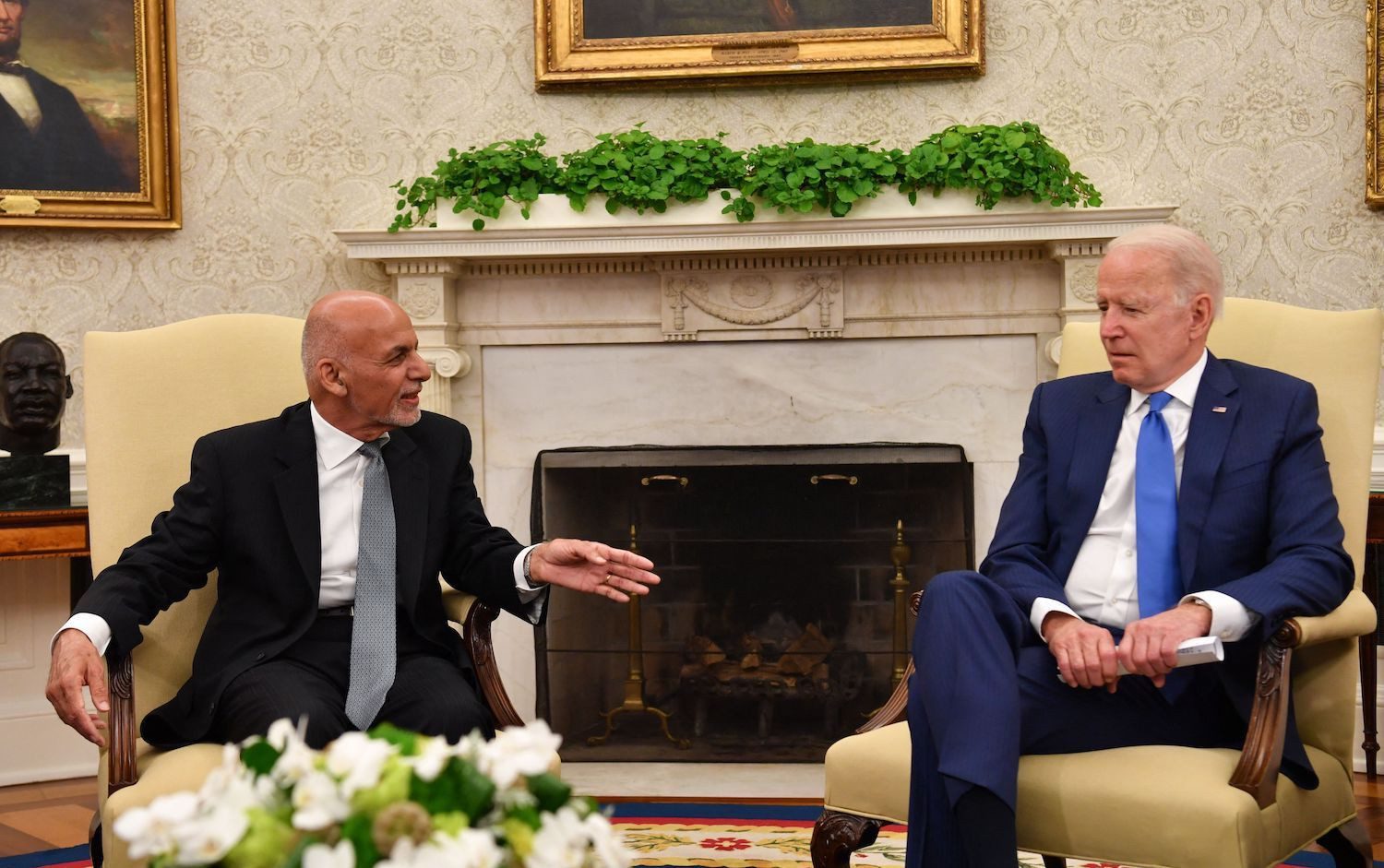Inside the Final Countdown to Leave Afghanistan

WASHINGTON– For a president so often flagged for incoherence, he was perfectly clear.
“I want to talk about happy things,” Biden told reporters Friday, when asked about Afghanistan. “It’s a holiday weekend.” The new president said: “I’m not going to answer any more questions about Afghanistan.” Said Biden: “I’ll answer all your negative questions – not negative, your legitimate questions,” later, next week.
Scat, pronto, in other words. In a phrase: come on, man.
As the president declared: “There are great things happening,” just not necessarily in Afghanistan. The revealing exchange comes as his administration tries to bring a legacy-defining maneuver of realism and restraint, a true withdrawal from America’s longest war, over the finish line.
The bromide came as President Ashraf Ghani (of the official government in Kabul) was in town this week, ostensibly in a last-ditch effort to delay the inevitable.
The U.S. president assured continued support for Ghani’s state, even though combat forces are set, more or less, to truly exit by September 11, 2021. The choice of the solemn anniversary of the attacks plotted from Afghanistan that set America on two decades, and counting, of a dragnet over the greater Middle East and Central Asia, of course being no accident.
But: Biden’s commitment comes as Ghani’s line of communication to the American negotiating team, led by U.S. Special Representative Zalmay Khalilzad, couldn’t be more compromised. As first reported by Dexter Filkins in The New Yorker, when Khalilzad, an erstwhile Republican official, visited Afghanistan amidst the tumultuous transition between Presidents Trump and Biden, a stewing Ghani, Khalilizad’s old friend, denied him an audience.
Regardless, the Taliban continues a long march.
The U.S. and its cadres ditched Bagram Air Base this week, its last large military installation in the country. And the Islamist counter-government continues to gain territory. The Wall Street Journal reported Friday that the U.S. is weighing an emergency evacuation of the embassy in August, quite plausibly to spare Biden the political blow of a “last exit from Saigon” image.
But for now, related queries only draw the president’s ire. Nineteen “years ago the U.S. had routed the Taliban and scattered al Qaeda,” Benjamin H. Friedman of Defense Priorities emphasized to me. “We are told that the Taliban might take power when we’re gone. Maybe so but how long can you prop up something that’s not sustainable?”
A former senior Trump administration official once told me a final trepidation for the 45th president was fear of blowback in the press: the morbid, though hardly guaranteed, prospect of brutal, indeed plausibly televised reprisals against women in particular, who have participated in the modern civil society of Afghanistan.
It’s tough stuff that would weigh heavily on any White House.
But Biden’s team is chock-full of old-line interventionists committed to a humanitarianism that does not flinch from identitarianism. Or as Samantha Power, the administrator of the United States Agency for International Development (USAID) said Friday: “Good afternoon. I come bearing a simple message: if you want peace in this world, trust women to deliver it.”
So, for those who want the fullest exit possible, there have been mild setbacks.
Against such a sorry backdrop for Ghani, Biden has pledged continued humanitarian aid and weapons guarantees to Kabul. Drawing the ire of the Taliban, Biden has dangled the prospect of leaving some sort of residual force.
But those who favor the president’s direction emphasize that American pullback won’t ignite a civil war. Depending on who one trusts, The Taliban has plausibly controlled more territory than ever for some time. This country is already in civil war. And that will be true with or without American troops in the crossfire.
Though radical, the Taliban has incentives.
It’s true, the group has bled some hardliners, principally to the peripheral but plainly menacing Islamic State group chapter in the country. But to ruin, anew, a relationship with Washington— such flagrancy would spoil whatever prospects for a modicum of international legitimacy in the future.
If, indeed, they’re back in the saddle in some time.
For now, the U.S. campaign in Afghanistan has outlived Osama bin Laden, Mullah Mohammed Omar, the mujahideen commander of the Taliban at the time of September 11, and as of this week, Donald Rumsfeld, the U.S. Defense secretary who originally sent American men and women into battle. If the wave rolls back, it will be bitter vindication to those who maintained America should have left a troubled beachhead far earlier.
Comments